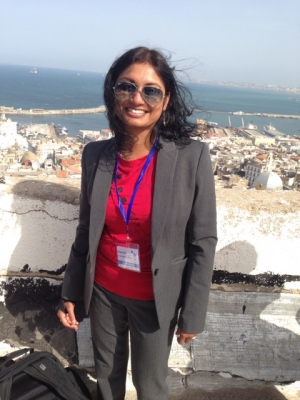Mathematical modelling key to controlling Malaria


Dr Sheetal Silal at a conference in Algeria
Dr Sheetal Silal, from the Department of Statistical Sciences at UCT, a speaker at the meeting said that mathematical modelling is a powerful tool that is being used globally to guide efforts towards better malaria control and global malaria elimination. Dr Silal, whose PhD work on malarial modelling in Mpumalanga is the first mathematical modelling application to malaria in South Africa, said that it is necessary to create and develop mathematical modelling skills and build the pool of people working on malaria modelling to increase capacity in the country and in Africa.
“Mathematical modelling is important as it could help in the decision-making process” Dr Silal said, while cautioning that it is not a panacea to the malaria elimination issue. She explained that Mathematical Modelling uses mathematics and computer simulation to describe the epidemiology of infectious diseases so that transmission may be better understood and predicted. It can inform public health policy through optimising resource allocation, assessing strategies to minimise the evolution of drug resistance and assessing how new tools and combinations of such tools can interrupt disease transmission.
Dr Silal’s work is done in conjunction with the UCT’s Faculty of Health Science and the National Department of Health South Africa aims to eliminate local malaria transmission by 2018.
